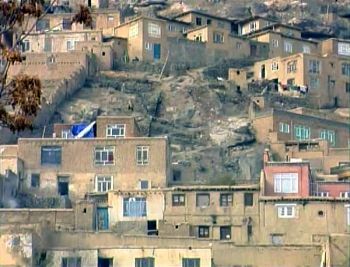
Publisher:
Bonnie King
CONTACT:
Newsroom@Salem-news.com
Advertising:
Adsales@Salem-news.com

~Truth~
~Justice~
~Peace~
TJP
Jun-23-2012 01:54

 TweetFollow @OregonNews
TweetFollow @OregonNews
Water Reform in Afghanistan: Facing the Implementation Gap
Salem-News.comLocal government and national actors still play a leading role in shaping water allocation processes.
 One of Kabul, Afghanistan's neighborhoods where water can be scarce. 2006 Salem-News.com photo by Tim King. |
(KABUL, Afghanistan) - In 2009, Afghanistan’s Water Law formally introduced a series of “good” water governance concepts as part of a wider attempt to reform the country’s water sector. These included integrated water resource management, river basin management and participation in decentralised decision-making via Multi-Stakeholder Platforms (MSPs).
With this context in mind, a new AREU paper lays out the results of research carried out during the dry year of 2011 in the Taloqan and Lower-Kunduz sub-basins, where the Panj- Amu River Basin Program has piloted the introduction of these imported governance approaches since 2005.
In doing so, it attempts to provide a better understanding of how local institutions currently deal with water allocation at the sub-basin level in times of drought, and discusses their policy implications for the current institutional transition. The research shows that water allocation practices still diverge significantly from the concepts promoted by the Water Law.
Contrary to the ideals of decentralisation and devolution of decision-making to water users, local government and national actors still play a leading role in shaping water allocation processes. In addition, it highlights how the MSPs that emerged in 2011 were significantly more flexible and adaptive in their composition than the (as-yet unconstituted) river basin agencies and councils envisioned by the Law.
It also underlines how, despite defying “good” governance principles, the institutional arrangements at work in 2011 led to relatively positive outcomes in terms of water access for downstream users, suggesting that a strict application of policy models may sometimes be counter-productive. Nevertheless, the findings also suggest that recent gains remain fragile and reversible.
Finally, the authors recommend that stakeholders collectively revisit the governance principles of the Water Law to identify compromises for a realistic translation of theoretical models into workable practices. Mind the Gap? Local practices and institutional reforms for water allocation in Afghanistan’s Panj-Amu River Basin, by Vincent Thomas, with Wamiqullah Mumtaz and Mujib Ahmad Azizi, is now available for download at www.areu.org.af.
Source: The Afghanistan Research and Evaluation Unit (Website: www.areu.org.af); an independent research organisation based in Kabul. AREU’s mission is to inform and influence policy and practice through conducting high-quality, policy-relevant research.
Afghanistan Research and Evaluation Unit House 649, third street on the right; Haji Yacoub Square toward Shaheed Square Shahr-i-Naw, Kabul Phone: +93 (0) 799 608 548 | Email: publications@areu.org.af
-------------------------------
Tweet
Follow @OregonNews
 |
 |
 |
 |
 |
 |
 |
Articles for June 22, 2012 | Articles for June 23, 2012 | Articles for June 24, 2012



Quick Links
DINING
Willamette UniversityGoudy Commons Cafe
Dine on the Queen
Willamette Queen Sternwheeler
MUST SEE SALEM
Oregon Capitol ToursCapitol History Gateway
Willamette River Ride
Willamette Queen Sternwheeler
Historic Home Tours:
Deepwood Museum
The Bush House
Gaiety Hollow Garden
AUCTIONS - APPRAISALS
Auction Masters & AppraisalsCONSTRUCTION SERVICES
Roofing and ContractingSheridan, Ore.
ONLINE SHOPPING
Special Occasion DressesAdvertise with Salem-News
Contact:AdSales@Salem-News.com
googlec507860f6901db00.html

Terms of Service | Privacy Policy
All comments and messages are approved by people and self promotional links or unacceptable comments are denied.
[Return to Top]
©2026 Salem-News.com. All opinions expressed in this article are those of the author and do not necessarily reflect those of Salem-News.com.